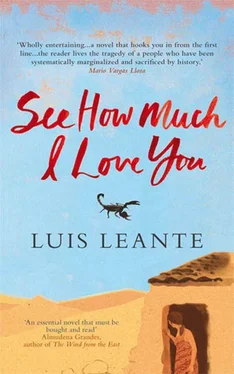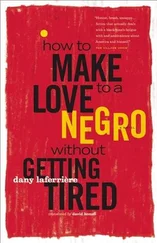‘Tell me. I’m intrigued.’
‘Well, you see, about a month ago an army patrol turned up with this half-dead woman.’
‘A patrol, you say?’
‘Two men in a four-by-four. They said they’d left from Smara that morning with a group towards the Wall.’
‘Do you remember any names?’
‘No. I’d never seen them before, and they didn’t identify themselves.’
‘It’s all very strange. No patrol has informed me that they found a woman or brought her to this hospital.’
‘From what they said, they were part of a convoy travelling to the free territories. They didn’t explain much, but I understood they’d left at dawn and, thirty kilometres later, found a woman in the middle of the desert. She was one of us, a Saharawi, and signalled to them from a distance to attract their attention. When they went over, she said another woman had been left for dead about a day’s walk to the north. From what she explained, the woman had been stung by a scorpion.’
‘One of us, alone in the desert?’
‘That’s what they said.’
‘Did you speak to her?’
‘She was not in the vehicle. She stayed where they found her, about thirty kilometres away from Smara. And on her own, as they said, because the convoy continued towards the Wall.’
‘It’s all very strange.’
‘I thought so too. That’s why I sent the letter to the ministry. I thought you’d reply a lot sooner.’
Colonel Mulud ignores the last remark. He’d rather have an explanation. Eventually he asks:
‘Didn’t any of the soldiers give any more details about the women?’
‘They were in a hurry. For them it was just a hassle. I suggested they write a full report, and they gave me a withering look.’
‘But it was their duty.’
The director pours the tea into the glasses. The sound of the falling liquid fills the room. For a moment words are swept aside, and both men are engrossed in the contemplation of the shiny tray.
Aza was convinced she was going to die. As she fled, she was trying to avoid running in a straight line. The sun was in front of her, so she had a slight advantage, but her legs moved more slowly than her mind dictated. She ran in a tortuous zigzag, looking for an elevation on the ground, a little mound, a slope where she could dive for cover. In a daze of anxiety, she ended up going in the worst direction. She was so nervous she couldn’t decide what to do. Before she even realised, she was running on soft sand. Her stride became shorter and clumsier. With each step she sank up to her calf. She knew she only had a very small lead, and didn’t even want to turn round to check on it. She ended up walking with her eyes fixed to the ground, in a straight line. Her shoulders felt weighed down, and her legs were burning; besides, her melfa was getting in the way, although she didn’t want to cast it aside and leave it behind. Then she heard a clear metallic sound that she knew well. Someone was loading a rifle — and was taking his time. She summoned all her strength and ran a bit further. At that moment a gust of wind blew around her, but even in those conditions she heard, as if right next to her, the report of the rifle. The melfa got tangled in her legs and she fell forward onto the sand. It all happened so fast that at first she didn’t know whether it was her own clumsiness or the bullet that brought her down.
All she could hear now was the whistling of the wind as it whipped up huge clouds of dust. Her whole body ached, but her mind was regaining awareness. Lying on the ground she couldn’t see her pursuers, which meant they couldn’t see her either. She moved a bit and touched her back without rising. She was unhurt: the bullet had missed her. Almost instinctively she clung to the ground and started digging into it. The sand was very soft, and the wind helped. Her mind reacted surprisingly quickly. In a frenzy, she started digging with her feet, her legs, her whole body. After a few minutes she had hollowed out a considerable space in the sand. She rolled into it and started to cover herself. She placed the melfa over her face and covered it with some difficulty. The wind took care of the rest. After a while she was completely buried, with her face barely a few centimetres from the surface. She could hear the sound of the wind and even, depending on which way it blew, the voices of Le Monsieur and his men.
Many times Aza had heard her elders tell stories about the war. She had heard them so much that she’d stopped paying attention, but she’d never entirely forgotten them. The Saharawi shepherds who, in the seventies, had become warriors and fought the same way and using the same tactics as their ancestors. When laying ambushes for the Moroccans, the Saharawis had often buried themselves. Aza’s uncle had told her many times how, buried in the sand, he’d felt an armoured vehicle pass over him. You needed a lot of sangfroid, as her uncle had often said as well. Aza tried to remember those stories as she was in the sand, and regretted not having been more attentive, she had not anticipated how useful those guerrilla tactics might be.
Her heart felt like a bomb about to go off. Aza knew her worst enemy would be anxiety. She tried to think of pleasant things. She thought of her son and her mother. She remembered the seafront in Havana, with those old cars miraculously winding up and down the street. The desert wind started to resemble the wind of the Caribbean, whose fearsome waves broke against the rocks of the jetty. She recalled the day of her wedding. Though breathing with difficulty, she calmed herself little by little, until her thoughts blended in with the voices of the despicable men who thought they had killed her. Then she recognised Le Monsieur’s voice, speaking in French with the mercenaries who followed him everywhere. Now and again he uttered curses in Spanish. She knew they were desperately looking for her, no doubt thinking she’d been gunned down. When her body did not appear they began to blame one another. They came so close she could hear their laboured breathing. And above their voices, she heard Le Monsieur, insulting them all and threatening to cut their throats. Aza feared her heart would give her away. She was trying to breathe deeply but very slowly. A few grains of sand slipped through the cloth of the melfa covering her face. She knew she wouldn’t be able stand the horrible situation for long. However, she would rather suffocate, buried, than fall into the hands of those criminals.
Every time Le Monsieur’s voice drew near, her body tensed up and her jaw locked. He got so close that for a moment she thought he would tread on her. The voices would alternately move away and return. The men were obviously walking in circles around the area where they’d seen her go down. It was an extremely tense atmosphere, and the mercenaries soon started arguing with each other. Aza knew men like that, and they were perfectly capable of killing one another because of an offence or a few insults. But the voice she heard most often was Le Monsieur’s. He was shouting himself hoarse. In the meantime, the wind was working in Aza’s favour. Not only had her footsteps been erased, but also the sand kept accumulating on the imperceptible mound that her body made on the surface of the desert, so that she became better and better hidden.
As the voices grew distant, Aza weighed up her chances of survival. It had been ten hours since she’d last drunk any water, which of course didn’t help. Also, after running away from the mercenaries, she had started sweating, and moisture was seeping out of her pores. In spite of the wind, the sand was burning hot in the sun. Any Saharawi knew full well what it meant to be stranded in the desert without water. She’d seen cases of death by dehydration, and it was a terrible end. For a moment she wondered whether it would be worse to be shot or die of thirst. But she was so scared that she was incapable of deciding. If the men went away in both vehicles, her chances would be slim. She anxiously thought of the washing-up bowl filled with filthy water near the hellish oasis. And, listening to the maddened voices of her pursuers, she reached the conclusion that it was preferable to withstand the terrible effects of thirst to being captured by them. Her mouth felt dry and full of sand. She strove not to lose control of her body and mind. She closed her eyes and pictured herself in her jaima ,7 with her son next to her. She tried hard to distract herself. For a while her heartbeat almost went back to normal.
Читать дальше




![Ally Carter - [Gallagher Girls 01] I'd Tell You I Love You But Then I'd Have to Kill You](/books/262179/ally-carter-gallagher-girls-01-i-d-tell-you-i-lo-thumb.webp)







